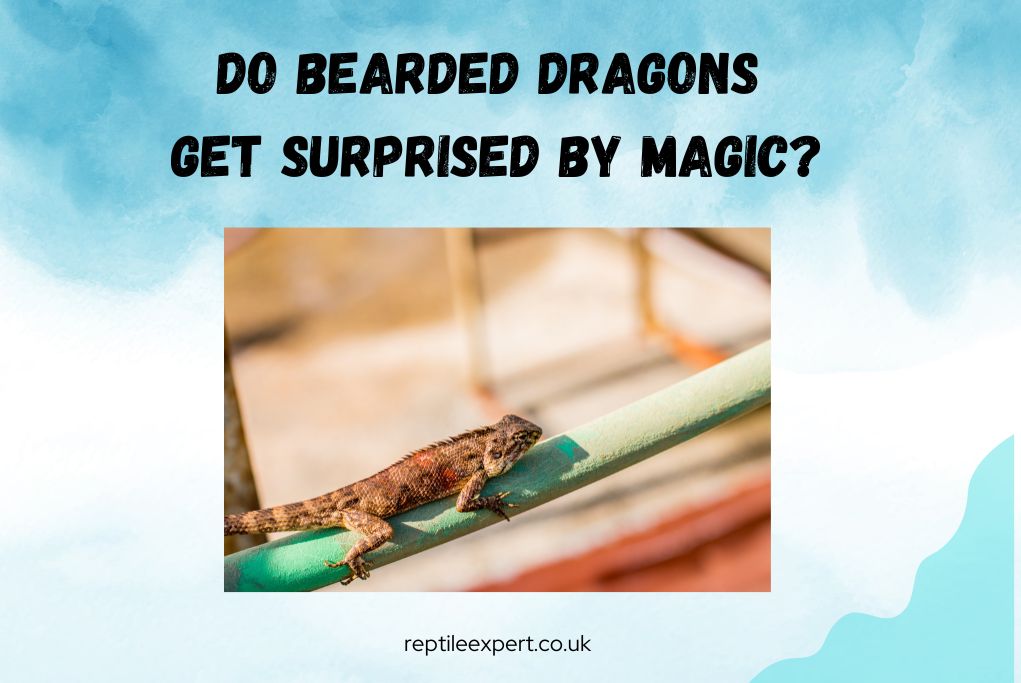Bearded dragons are outgoing animals with distinctive personalities and quirks. If you’ve ever owned one, you know how observantly they look around their environment.
While they might not react to magic tricks as vividly as humans would, their responses provide valuable insights into their intelligence and visual capabilities.
In this article, we will explore whether or not bearded Dragons Get Surprised by Magic.
Understanding Bearded Dragon Cognition

Bearded dragons might not be the most intelligent animals in the animal kingdom, but they demonstrate impressive cognitive abilities among reptiles. They can recognize their owners, react to stimuli, and learn through observation. Studies of reptile cognition suggest they are capable of simple problem-solving and can discriminate between different objects and movements.
However, their brains function differently from human or bird brains. Bearded dragons don’t contemplate why something happens — they focus on what happens. While they may not understand the concept of magic, they can react to sudden changes they observe in their environment.
Behavioral Responses in Bearded Dragons
Bearded dragons communicate primarily through body language. When presented with something novel and unexpected, they might:
- Puff out their beard to make it appear larger
- Bob their heads or remain motionless to process the situation
- Use their tongue to gather sensory information
When you make something suddenly appear or disappear in front of them, they’ll often squint as if to ask, “What just happened?” This reaction isn’t necessarily shock but rather a combination of curiosity and cautious observation.
Vision and Bearded Dragons: The Magic of Sight
Bearded dragons rely on their sharp vision to navigate their world. They can track movements from considerable distances, making them particularly sensitive to visual changes. This visual acuity is one reason why magic tricks or sleight-of-hand movements may capture their attention.
When you conceal something behind your hand and reveal it later, for example, a bearded dragon will observe the motion intently. While we can’t definitively call this “surprise,” they clearly notice and respond to these visual signals.
Experimenting with Magic Tricks
Some owners have experimented with simple magic tricks with their bearded dragons, including:
- The Disappearing Treat: Concealing a treat under a cup and making it “vanish”
- Disappearing Object: Hiding something in one hand and making it “appear” in the other
Reactions vary among individuals. Some dragons show intense interest, while others may appear indifferent. The key factor is their ability to track the movement—if it’s too rapid or unusual, they may become momentarily confused.
Surprise vs. Curiosity in Bearded Dragons
For humans, surprise is an emotional response when expectations are violated. Bearded dragons’ responses stem from instinct rather than emotion. When they pause to process something, it’s not necessarily “surprise” in human terms. Instead, they’re more likely to act on curiosity or instinctive assessment of potential threats or rewards.
Practical Guidelines for Bearded Dragon Owners
Consider these important points when using magic as a form of enrichment:
- Be Gentle: Execute movements slowly and carefully to avoid startling them
- Monitor for Stress: Watch for signs of distress such as beard puffing or erratic movement, and stop if they appear uncomfortable
- Include Rewards: Incorporate treats to make the experience enjoyable and rewarding
- Remember Your Goal: Focus on fostering curiosity rather than causing confusion or distress
Conclusion
While bearded dragons may not comprehend magic tricks as we do, they can perceive visual illusions through their sensory capabilities.
Their response isn’t truly surprise but rather curiosity. Introducing them to new experiences can be an excellent way to provide enrichment in their lives.
If you learned something reading this article make sure you check out how big do bearded dragons get.
Frequently Asked Questions
Do bearded dragons recognize their owners?
Yes, bearded dragons can identify specific individuals through sight, smell, and behavioral patterns.
Can bearded dragons enjoy games?
While they don’t experience emotions the same way humans do, they can engage with and enjoy interactive games and simple puzzles.
What are common signs of stress in bearded dragons?
Stress indicators include freezing in place, beard darkening, sudden movements, or retreating from interaction.
Can bearded dragons see colors?
Yes, they have good color vision and can distinguish between bright colors.
Is it safe to perform magic tricks with my bearded dragon?
Yes, as long as the illusions are brief and don’t cause stress or fear.

